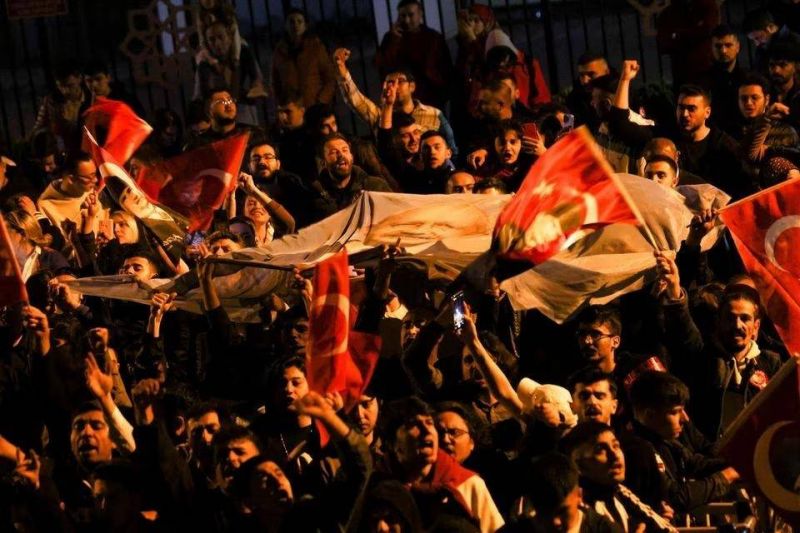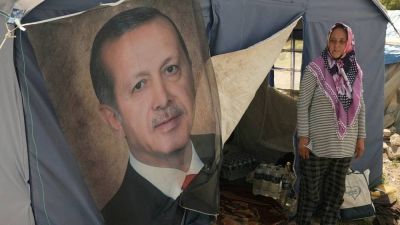
Supporters of Kemal Kilicdaroglu, presidential candidate of Turkey's main opposition alliance, react at the Republican People's Party (CHP) headquarters in Ankara, Turkey May 15, 2023. (Credit: Cagla Gurdogan/Reuters)
ISTANBUL — Turks vote on May 28 in a presidential election runoff between the incumbent Tayyip Erdogan and his challenger, Kemal Kilicdaroglu, that will decide whether the president extends his rule into a third decade.
Here is a guide to the runoff, the two candidates and the key issues as well as details on how the May 14 parliamentary election unfolded:
Presidential vote
Turks will be electing a president for a five-year term.
In the first round of voting on May 14, Erdogan got 49.5 percent support, falling just short of the majority needed to avoid a runoff in a vote seen as a referendum on his autocratic rule.
Kilicdaroglu, the candidate of a six-party opposition alliance, received 44.9 percent support. Nationalist candidate Sinan Ogan came third with 5.2 percent support and was eliminated. The outcome confounded the expectations of pollsters who had put Kilicdaroglu ahead.
A referendum in 2017 narrowly approved Erdogan's move to broaden the powers of the presidency, making the president head of government and abolishing the post of prime minister.
As president, Erdogan sets policy on Turkey's economy, security, domestic and international affairs.
Parliamentary vote
Turks also voted in a parliamentary election on May 14. Erdogan's Islamist-rooted AK Party emerged as the largest party, as expected, and his alliance with nationalists and Islamists won a majority in parliament.
The AKP won 268 seats in the 600-member assembly, while the People's Alliance which it leads took 322 seats. The main opposition People's Republican Party (CHP) of Kilicdaroglu won 169 seats, with its Nation Alliance having 212 lawmakers.
The pro-Kurdish HDP, which ran under the banner of the Green Left Party (YSP) due to a court closure case, won 61 seats. It is not in Kilicdaroglu's alliance but, fiercely opposed to Erdogan, strongly backed the CHP leader.
Support for Erdogan's AKP tumbled seven points from the 42.6 percent which it won in the 2018 elections, but with his alliance enjoying a parliamentary majority he has called on voters to support him in order to ensure political stability.
The Candidates:
President Tayyip Erdogan
More than 20 years after Erdogan and his AKP came to power, he hopes to extend his tenure as modern Turkey's longest-serving ruler.
His strong performance on May 14, when he managed to mobilize conservative voters, defied predictions of his political demise.
Victory would entrench the rule of a leader who has transformed Turkey, reshaping the secular state founded 100 years ago to fit his pious vision while consolidating power in his hands in what critics see as a march to autocracy.
Kemal Kilicdaroglu
Kilicdaroglu is both the main opposition candidate and chairman of the CHP, which was established by Mustafa Kemal Ataturk - the founder of modern Turkey.
He has offered voters an inclusive platform and promises a democratic reset, including a return to a parliamentary system of government and independence for a judiciary that critics say Erdogan has used to crack down on dissent.
However, his rhetoric since May 14 has taken a hawkish turn as he reaches out to nationalist voters in his bid to overtake Erdogan, vowing to send back 10 million refugees.
'Kingmaker'
A key factor in the outcome of the May 28 vote will be how the supporters of third-placed candidate Ogan vote. He has not endorsed either candidate yet but could be a potential "kingmaker" if he comes out in support of one of them.
In an interview with Reuters on May 15, Ogan said he could only support Kilicdaroglu in the runoff if he agrees to offer no concessions to a pro-Kurdish party.
What is at stake?
The vote will decide not only who leads Turkey, a NATO-member country of 85 million, but also how it is governed, where its economy is headed amid a deep cost of living crisis, and the shape of its foreign policy.
Erdogan's critics say his government has muzzled dissent, eroded rights and brought the judicial system under its sway, a charge denied by officials.
Turkey's economy is also in focus. Economists say it was Erdogan's unorthodox policy of low interest rates despite surging prices that drove inflation to 85 percent last year, and the lira slumping to one-tenth of its value against the dollar over the last decade. Kilicdaroglu has pledged to return to a more orthodox economic policy and to restore the independence of the Turkish central bank.
On foreign affairs, under Erdogan, Turkey has flexed military power in the Middle East and beyond, forged closer ties with Russia, and seen relations with the European Union and the United States become increasingly strained.
Turkey and the United Nations also brokered a deal between Moscow and Kyiv for Ukrainian wheat exports and Erdogan announced on Wednesday the latest two-month extension.
Polling
More than 64 million Turks are eligible to vote at nearly 192,000 polling stations, including more than 6 million who were first-time voters on May 14. There are 3.4 million voters overseas, who will be voting between May 20-24.
Polls open at 8 a.m. (0500 GMT) and close at 5 p.m. (1400 GMT) on May 28.
Turnout in Turkish elections is generally high. On May 14, the turnout in Turkey was 88.9 percent of eligible voters.
Results
Under election rules, news, forecasts and commentaries about the vote are banned until 6 p.m. (13:00 GMT) and media are only free to report on election results from 9 p.m. (18:00 GMT).
However, the High Election Board may allow media to report on results earlier and usually do.

